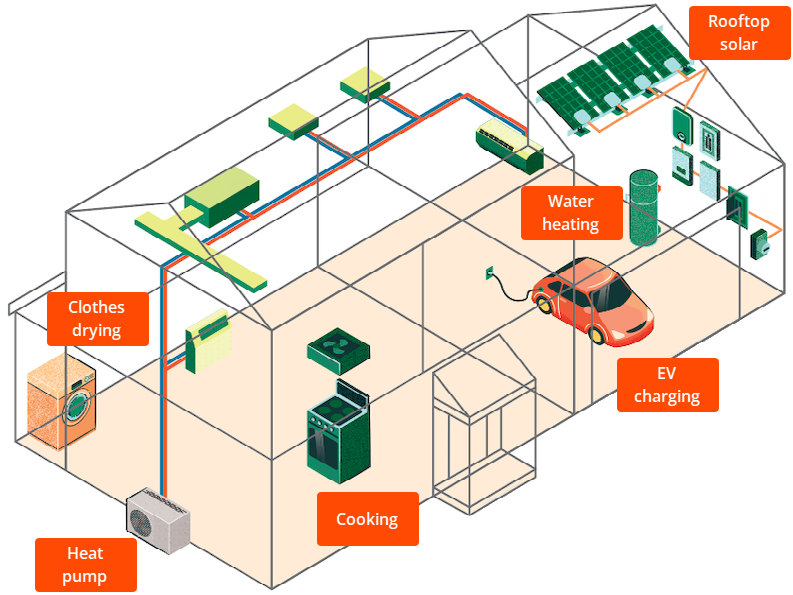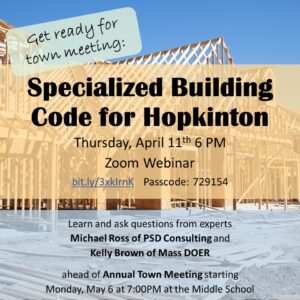What does an all-electric home look like?
The specialized code allows multiple paths in order to preserve market choice for builders and home buyers. But what does it really mean to choose an all-electric home? There you have choices also!

Find out more:
Additional frequently asked questions
Process
Don’t we already have a building code?
Yes. In 2010 Hopkinton adopted a stretch code which was ultimately adopted by 300 cities and towns. The stretch code and its updates every three years have made a significant difference in home efficiency. The specialized code proposed here would take us a step further, encouraging either 1) full energy-efficient electrification or 2) electric-ready construction complemented with onsite renewable energy. Unlike the stretch code, the specialized code applies to NEW buildings only. If the specialized code is adopted, both codes will be in effect.
Didn’t we already vote on this at Town Meeting?
Yes. At Special Town Meeting in 2023, this article failed by a small margin. Many people expressed concern that they didn’t know enough about the specialized code to be confident of their vote. This website is part of an effort to make sure all voters attending Annual Town Meeting in 2024 can vote with confidence.
What’s the rush?
The majority of Hopkinton’s emissions come from buildings and about half of all our building emissions come from gas and oil. Our fossil fuel usage continues to increase as the majority of new buildings in recent years have only added to our fossil fuel burden. The best numbers available suggest that Hopkinton is not yet on track to achieve its goal of net zero carbon emissions by 2045. The specialized code could make a significant difference, particularly if adopted as soon as possible.
For more information, visit the Urgency page.
Personal impact
My house is too shaded for solar. Do I have to cut down trees?
- This code will have NO impact on you unless you are constructing a new building in Hopkinton.
- The specialized code defines when there are exceptions for solar based on shading, roof angle, and direction. If the potential solar zone is less than 300 sq ft, than solar does not need to be installed.
- The one additional requirement is that houses over 4000 sq. ft. following a mixed fuel path need to have sufficient solar to offset the annual home energy usage.
- This code encourages planning with rooftop solar in mind. Builders will know the requirement from the beginning and can design in a way that accommodates solar by minimizing roof obstructions.
- In Hopkinton, houses over 4000 sq. ft. are usually built on large lots that do not have shading impact on the rooftop.
Will I have to get solar panels?
No. The specialized code applies to NEW buildings only. Additions and renovations are NOT impacted. Even if you are building a new home, you will still have a choice:
- If your home will be 4,000 square feet or smaller, you can either build all-electric, or pre-wire it for electric and (unless your lot is shaded) add at least 4kW of solar panels on site.
- If your home will be greater than 4,000 square feet, you can either build all-electric, or certify it as a Net Zero Building.

What happens if we lose power? Can I still use a generator?
Yes. Homeowners will have the same options as today. Even with the all-electric path, the home can have an emergency backup generator.
Home batteries are an increasingly popular option when paired with solar, and are a greener way to maintain power in an outage. Some models of electric vehicles can even act as a backup battery for the home.
I love my gas stove! Are you trying to take it away?
The specialized code will have NO impact on you unless you are constructing a new building in Hopkinton. Even then, the code does not ban fossil fuels. You can chose to follow the mixed fuel path to install a gas stove if that is your preference.
Induction stoves are electric powered and are becoming widely embraced by professional chefs for control, fast boiling, health, and safety. Induction cooktops are not the same as traditional electric cooktops. Pre-wiring enables a homeowner to choose to update their gas stove with an induction stove in a few years when a replacement is needed.
Infrastructure
Can the grid handle it?
- Because of the efficiency of heat pumps, especially in buildings already insulated to conform to the stretch code, the overall grid demand impact of electrifying buildings is only expected to be a 5% increase.
- Grid build out will always respond to demand. It’s true that we can’t expect the grid today will meet needs of 10 years from now. But as the need grows, so will the supply and transmission. Also, intentional state and national programs focus on building up the grid, as well as renewable energy sources such as offshore wind.
- The specialized code requires buildings following a mixed fuel path to offset energy usage with onsite solar. This helps distribute the renewable energy supply.
Is this really greener if the grid is burning gas?
Yes, for two reasons:
- Electric appliances such heat pumps and induction stoves use less energy than their fossil fuel counterparts.
- The grid is getting greener every year. In 2021, 48.2% of MA electricity consumption was met with clean power. Using electricity that is 50% gas sourced is greener than using a 100% gas powered furnace, and greener still than using a 100% oil powered furnace.
Town growth
Will this stop housing developments in Hopkinton?
The specialized code is unlikely to have any direct impact on the amount of construction in Hopkinton for the following reasons:
- Our school rankings, lakes, state park, infrastructure, services, and proximity to major highways will remain.
- Over a quarter of the of the state’s population has already adopted this code, with more expected this spring. As the specialized code becomes the norm throughout Massachusetts, it will simply be how homes are built.
- Electric or electric ready homes will appeal to homeowners who wish to save money over the long run and not get locked into fossil fuels and expensive retrofitting.
Will this stop commercial development in Hopkinton?
- Most new business coming to Hopkinton will be in existing buildings and therefore will not be affected by the specialized code.
- Large businesses often have their own internal emissions reduction goals. This building code can help support achieving those objectives.
- Hopkinton enjoys Platinum BioReady status, suggesting that we will be an ideal location for the biotech and science industry. 9 other municipalities with Platinum status have already adopted the Specialized Code.
- The specialized code compliance pathways relate to building needs (e.g., air and water heating), not the manufacturing processes or commercial kitchens. Fossil fuel required for a manufacturing process is exempt from the specialized code.
Financial
What will this cost the town?
There will be no cost to the town. Free training is available to building inspectors. More importantly, adoption of the specialized code will entitle Hopkinton to seek additional funding from the state.
For more information, visit the Financial page.
Will the specialized code make building more expensive?
- Building all-electric is the least expensive path for compliance to this code. Data from Massachusetts new construction shows that in most cases all-electric construction is comparable or occasionally even less expensive than the mixed fuel alternatives for these reasons:
- There are extensive federal and state incentives for all-electric construction.
- There is no need to run gas lines.
- Heat pumps are one system that provides both heating and cooling.
- Building the mixed fuel path may incur additional expense as the pre-wiring must be installed in addition to the fossil fuel connection. However, the expense is still much less at the time of construction than it would be to retrofit later.
- For the mixed fuel path, solar must be installed onsite unless the lot is shaded. Solar can be purchase or leased, depending on what is better for the buyer. Owning the solar comes with an upfront cost, but saves more money for the homeowner or business. For single family homes less than 4,000 sq ft, only 4kW of solar is required, which costs approximately $10,000 in MA after rebates (30% federal and $1000 state). Leasing or a Power Purchase Agreement for solar can come with $0 upfront cost, and will still save the future owner money on electric bills as well.
For more specifics, visit the Financial page.
Will the specialized code be more expensive for homeowners?
- Owners of new homes and buildings with heat pumps are likely to benefit from savings in operational costs over time.
- If solar is installed, the costs of electricity for the homeowner are reduced and can even be eliminated.
- It the homeowner is ready to change from a gas to electric appliance, it will be straightforward and less costly if the pre-wiring is already in place.
I thought electric heating was expensive. Why force people to use it?
- Electric heating today means heat pumps. Heat pumps both heat and cool your home with the same system. Because they move heat instead of creating heat, heat pumps are three times more energy efficient than a gas furnace. This is good for the environment as well as the energy bills.
- Heat pumps can be either ground sourced (often called geothermal) or air sourced. Most homes with use air sourced, with an outdoor unit about the size of an air conditioner compressor. Larger buildings such as the Elmwood School replacement often opt for ground sourced heat pumps which have more up front cost but higher efficiency.
- Major rebates are available from the federal Inflation Reduction Act and Mass Save. Zero percent heat pump loans are also an option from Mass Save.
- Heat pump technology has significantly changed over the past few years. Massachusetts homeowners are now advised to opt for cold climate heat pumps, which work well even into negative temperatures without any supplementary system.
- Ultimately, the specialized code does not force you to choose a heat pump, but does require the wiring to be in place so that you or the future homeowner can make an easy transition later.
Technical
Will this be a burden on building inspectors?
- Discussions began with Hopkinton’s inspectors in April 2023, over a year and a half before the specialized code, if approved, would take effect in January 2025. If the specialized code is approved at the 2024 Annual Town Meeting, there would still be over six months before the code would take effect, allowing inspectors to become familiar with the details.
- Multiple free trainings have been offered by the state and will continue to be offered. Inspectors will participate in those trainings anyway because they also cover the stretch code updates of January 2023.
- Confirming compliance to the specialized code can be accomplished in the same site visit as for the stretch code.
Will the specialized code add insulation requirements for homes?
- The specialized code will not change insulation requirements or the HERs
 rating for single family homes. However, there is a change taking effect in July 2024 as part of the stretch code, which Hopkinton has already adopted.
rating for single family homes. However, there is a change taking effect in July 2024 as part of the stretch code, which Hopkinton has already adopted. - These changes will complement the specialized code for a building that will stay warm or cold efficiently with minimal energy leakage. A well insulated home uses less energy, feels more comfortable, and saves the homeowner or renter money in the long run.


